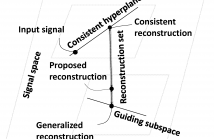
The IEEE Global Conference on Signal and Information Processing (GlobalSIP) is a flagship conference of the IEEE Signal Processing Society. GlobalSIP'15 will be held in Orlando, Florida, USA, December 14-16, 2015. The conference will focus on signal and information processing with an emphasis on up-and-coming signal processing themes. The conference will feature world-class speakers, tutorials, exhibits, and sessions consisting of poster or oral presentations. Outstanding papers will be selected for Best Paper Awards or Best Student Paper Awards; a paper is eligible for a best student paper award if the first author of the paper is a student. IEEE Signal Processing Society and National Science Foundation will provide travel grants to eligible students.
- Read more about A PACKET LOSS RECOVERY TECHNIQUE WITH LINE SPECTRAL FREQUENCY MODIFICATION IN 3GPP EVS CODEC
- Log in to post comments
This paper examines a method for controlling the energy of decoded signal at the recovery frame from a packet loss. Our observation unveiled that a packet loss around speech onset causes sudden increase in the amplitude of the decoded signal at the recovery frame. To mitigate the artifact caused by the overshoot, a detector of the speech overshoot is proposed as well as a method that controls the amplitude of the decoded signal by adjusting distances of adjacent line spectral frequencies.
- Categories:
 14 Views
14 Views
- Read more about Guided Signal Reconstruction with Application to Image Magnification
- Log in to post comments
We propose signal reconstruction algorithms which utilize a guiding subspace that represents desired properties of reconstructed signals. Optimal reconstructed signals are shown to belong to a convex bounded set, called the ``reconstruction'' set. Iterative reconstruction algorithms, based on conjugate gradient methods, are developed to approximate optimal reconstructions with low memory and computational costs. Effectiveness of the proposed method is demonstrated with an application to image magnification.
- Categories:
 12 Views
12 Views- Read more about GlobalSIP 2015 Presentation:Optical Interference Alignment for an Indoor Visible Light Communication X-Channel
- Log in to post comments
This is the presentation slide for GlobalSIP 2015. Our accepted paper title is "Optical Interference Alignment for an Indoor Visible Light Communication X-Channel".
- Categories:
 17 Views
17 Views- Categories:
 7 Views
7 ViewsThis paper presents methods to compare high order networks using persistent homology. High order networks induce well-founded homolog- ical features and the difference between networks is measured by the difference between the homological features. This is a reasonable approximation to a valid metric in the space of high order networks modulo permutation isomorphisms. The approximations succeed in discriminating engineering research communities from mathematics communities.
- Categories:
 13 Views
13 Views- Read more about Sensor Selection in Energy Harvesting Wireless Sensor Networks
- Log in to post comments
In this paper, we propose a novel energy harvesting (EH)-aware sensor selection policy. Our goal is to minimize the distortion in the reconstruction of the underlying source subject to the causality constraints imposed by the EH process at the sensor nodes. Besides, we determine the optimal power allocation for a given sensor selection (which admits a two-dimensional directional waterfilling interpretation) as the solution of an offline convex optimization problem. To that aim, we propose an iterative procedure.
- Categories:
 8 Views
8 Views- Read more about Tree-Structured Algorithm For Efficient Shearlet-domain Light Field Reconstruction
- Log in to post comments
- Categories:
 6 Views
6 Views- Read more about A 6.16Gb/s 4.7pJ/bit/iteration LDPC decoder for IEEE 802.11ad standard in 40nm LP-CMOS
- Log in to post comments
This paper presents an LDPC decoder employing a column-parallel architecture that enables low-power and high-speed operation suitable for the 802.11ad standard. As compared to the conventional row-parallel architecture, the proposed architecture reduces the required memory size by 60% and also minimizes the number of pipeline stages for high throughput operation.
- Categories:
 12 Views
12 Views- Read more about Simulation of grain growth in polycrystalline materials: A signal processing perspective
- Log in to post comments
- Categories:
 6 Views
6 Views